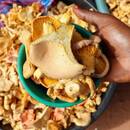Noticias

In Aboudé Kouassikro, in the Agnéby-Tiassa region, MORONOU Oba Philomène is a 45-year-old single mother. For over 10 years now, she has been traveling 10 kilometers a day to reach her cocoa plantation. Having dropped out of school after several failures in her final year of high school, she inherited a 3-hectares cocoa plot from her parents' death to take care of herself and her 3 children.
However, the already aging and poorly maintained plantation did not really allow her to be self-sufficient and independent. Despite her 9 hours of hard work each day to meet the expenses of her children's...
Sayouba Adama, a cocoa producer in the South Comoé region, "discovers the path to prosperity"
18/04/2024
18/04/2024

In the village of Ebikro-N’Dakro in the South Comoé region, Sayouba Adama, married and father of six children, is a well-known cocoa producer for his hard work. Despite his efforts, the annual production from his 2 hectares is always low and does not provide a decent living for him and his family.
With the advent of the project "Promoting cocoa production without deforestation to reduce emissions in Côte d'Ivoire" (PROMIRE) implemented by the Food and Agriculture Organization of the United Nations (FAO), he discovers agroforestry and applies it to his plantation. The initial results pleasantly surprise him. His production improves along...
Sustainable cocoa culture: When agroforestry practices bring smiles back to the Akalé Gohi couple
15/04/2024
15/04/2024

Akalé Gohi and his wife, a couple of cocoa farmers located in the Agnéby-Tiassa region, had no solution to save their 2.5-hectare plantation, which was deteriorating day by day due to the consequences of climate change. Then, they discovered agroforestry through the PROMIRE project. This technique, which they applied without hesitation, eventually brought smiles back to their faces.
"The sun was drying out my cocoa trees, causing them to lose their leaves and eventually die. I had no solution to remedy this, and I was at risk of losing my cocoa plantation," confesses Akalé Gohi Pascal.
In Aboudé-Kouassikro, in the Agnéby-Tiassa region...

The villages of Mani-Bereby, Pitiké, Téklébo, and Kablaké, located in the sub-prefecture of Grand Bereby, aim to contribute to the reforestation of the coastal area in Côte d'Ivoire through community actions. The Food and Agriculture Organization of the United Nations (FAO) is committing approximately USD 80,000 US dollars to support the initiative called "Restoration of mangroves in the future voluntary natural reserve of the mouth of the Dodo Grand Bereby River," presented on behalf of the village communities by the NGO Marine Species Conservation (CEM).
This initiative contributes to the implementation of component 3 of the project "Global Transformation of Forests...

Key messages:
Non-wood forest products (NWFPs) offer considerable opportunities for economic development and environmental sustainability, highlighting their potential as key resources in climate action initiatives.
By establishing and enhancing value chains for new NWFPs, there's a dual benefit: it not only increases the economic value of forests, thereby incentivizing their conservation, but also provides alternative livelihoods for communities, potentially reducing reliance on economic activities, like charcoal and agricultural production, which might put pressure on forests.
The process involved in selecting NWFPs for development is critical, emphasizing the importance of fieldwork. Engaging directly with communities and leveraging their knowledge and experience ensures that the...

